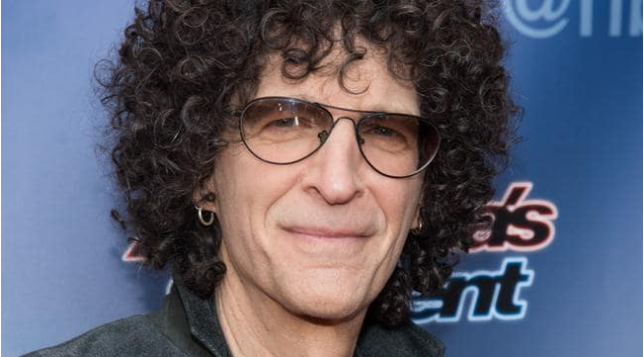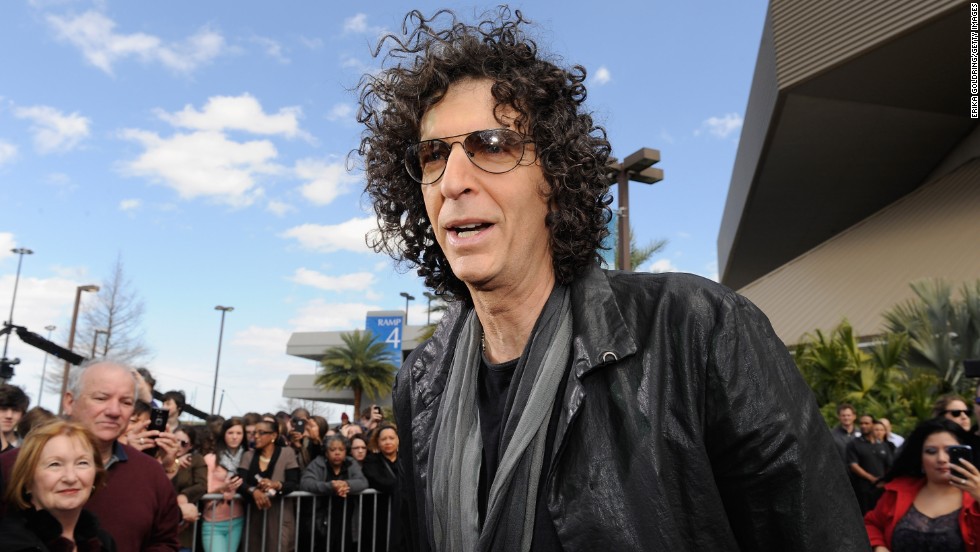This article is more than
6 year oldMeet the new Howard Stern. He’d like to make amends for the old Howard Stern.
![“I tried to watch some of my old Letterman [appearances],” says Howard Stern, photographed in his New York studio in May. “I couldn’t get through two minutes of it.” (Marvin Joseph/The Washington Post)](/uploads/news/2019_05/5qo5i7dn4ii6to7hdr4y7oafgy.jpg)
By Geoff Edgers
Years ago, when his main source of pleasure came from taunting Kathie Lee Gifford or watching porn stars disrobe in his studio, Howard Stern took his public appearances very seriously. The self-proclaimed “King of All Media” would storm onto late-night talk shows, all sunglasses and hair-metal locks, and proceed to do whatever he could to take over.
He mocked Jay. He mocked Dave. He mocked Arsenio. He mocked the size of his own penis. He wore a buttocks-baring “Fartman” costume to the MTV Video Music Awards. All of this led to headlines and huge ratings. And yet today, that version of Stern makes him “cringe.”
“I tried to watch some of my old Letterman [appearances], Stern said on a recent morning during an interview at his SiriusXM radio studio. “I couldn’t get through two minutes of it. It’s just not me. I don’t know who that guy is.”
That brings us to “Howard Stern Comes Again,” a new 549-page collection of his radio interviews that he hopes marks his evolution from an impatient and often nasty blabbermouth to a master conversationalist. In the foreword, Stern dismisses his previous two bestsellers, 1993’s “Private Parts” and 1995’s “Miss America.” He also distances himself from his previous persona. As he sees it, the old Howard was an insecure narcissist so terrified his audience would turn the dial that he bullied his guests to either submit or flee. The new Howard is a kinder, happier and more generous entertainer freed from the constrains of shock jockdom. The beginning of that transformation, he says, is easy to chart: The end of his 23-year marriage to Alison Berns in 2001. Miserable and disappointed, fearing how his three daughters would view him, Stern began seeing a psychotherapist four days a week.

during his “Fartman” routine at the
MTV Video Music Awards in September 1992.
(Kevork Djansezian/Associated Press)
Not all of his fans are happy with what he describes as his “personal evolution.” Some have gone online to blast this Howard Stern as a celebrity-boot-licking sellout who has lost his way. Stern is not particularly bothered by this.
“I do radio differently now than I did then,” says the 65-year-old host. “Have you ever tried to go back and look at your old photographs or your old anything or articles maybe you wrote and you say, ‘No, I’m a better writer now, a better performer — or not even better, but I do things in a different way.’”
[From 2015: Is Howard Stern going soft or just getting sharper?]
“Howard Stern Comes Again” arrived with little warning. A few months ago, the image of the book’s cover, with no details other than its title, appeared on Amazon and promptly shot to No. 1. Only in the past few weeks did Stern reveal what would be inside — a personally curated collection of transcripts, with meaty introductions in which he offers some context for the interviews. The subjects range from comedians (Amy Poehler, Steve Martin, Bill Murray) to musicians (Paul McCartney, Madonna, Jay-Z) to a pre-scandal Harvey Weinstein, who smugly dismisses the idea anybody could be taken advantage of on the casting couch. There is a chapter devoted to Stern’s most frustrating non-get, Hillary Clinton, as well as 11 excerpts from interviews with Donald Trump, a frequent guest long before he entered the White House. Stern’s relationship with Trump effectively ended during the 2016 campaign.
“Donald asked me to come speak on his behalf at the convention, and I had to be honest with him, and it was not comfortable,” says Stern. “I said, ‘Donald, that’s not where my heart lies.’ . . . I wanted Hillary Clinton to win. . . . Would she have now been president had she done my show? I’m not saying that, but I am saying the attitude of Joe Biden if he becomes a nominee or Mayor Pete or whoever it is, they better keep in mind. Trump speaks like a dude. I’m talking about his manner of speech, not the intellectual capacity, not the desire to be president, not the policy, but he talks in clips where people understand what he’s saying. Whether you agree with him or not. And it’s a good lesson for Hillary, and this is what I try to point out in the book.”
Stern was not always trying to coax presidential candidates into his studio. He began his rise in the 1980s at Washington’s DC101, launching lesbian “Dial-A-Date,” doing a bit that made light of the Air Florida crash in the Potomac River and openly dissing station management. He got fired, not for the first time, before landing at New York’s WNBC. Over the next two decades, as he moved to syndication, Stern created his own universe, made up of the competitors he openly taunted and the cadre of regular call-in misfits known as the “wack pack,” and defined by a focus on sex that led to Stern being popularly labeled a “shock jock.” He also racked up millions of dollars in fines from the Federal Communications Commission.


That incarnation of Stern did not get to interview former Beatles or Oscar winners. His guests were more likely D-listers, supporting players to whatever scandal-of-the-moment, such as Jessica Hahn or John Wayne Bobbitt.
Because when Stern did get an actual celebrity in the studio, he often blew it. Listen to him barely coax a chuckle out of Eddie Murphy. Or pester Gilda Radner with lame sex-life questions, oblivious to her discomfort until she cut the interview short and left.
Stern’s on-air persona left potential subjects wary.
“Howard was the last guy you wanted to menace,” says Letterman, who first hosted Stern on his NBC “Late Night” show in 1984. “He said some unpleasant things about my wife and just various little things, and I just thought, ‘What did I do to this guy?”
“I just felt like he would turn on me,” says Ellen DeGeneres, who resisted going on Stern’s show in the 1990s. “The humor was very aggressive, and I was just scared of that humor. I was scared of him and getting hurt by him or slammed by him, and he had massive fans. And I thought he could influence people to not like somebody if he didn’t like them.”
Stern’s power was clear when, in 2004, he announced he would leave terrestrial radio for satellite. SiriusXM’s listener base jumped from about 600,000 subscribers to more than 6 million by the end of Stern’s first year on the service.
By then, his evolution had begun. Post-divorce, he met and eventually married Beth Ostrosky, a model and animal-rights activist. He also found himself under less pressure at work: The FCC has no oversight of satellite, and SiriusXM does not have ratings. The therapized Stern began to make amends. He even apologized to Letterman for attacking him, violating his confidence and saying nasty things about the late-night host’s wife, Regina Lasko.
“And I thought, ‘Well, this is interesting,’” says Letterman. “If he’s apologizing to me, and I was never the central target, there is a pretty long list of people Howard must be apologizing to. And then when I would have him on the show, from that point on he was a different guy. You could actually sit and have a conversation, and he was thoughtful and he was smart and he was just empathetic. Not the enemy of humanity that people perceived him to be. And then I realized, well, you know, I really do like this guy.”
DeGeneres decided to go his show in 2015. They talked about her difficult childhood, including how she was molested by her stepfather.
“Anybody who is aggressive and a bully usually is that way because they don’t like themselves and they take it out on other people,” she says. “You only treat other people the way you would treat yourself. If you have compassion and empathy for yourself, you would have it for other people.”

Stern never intended to put out a third book. The first two were excruciating to write, particularly because of his obsessive-compulsive disorder. But Simon & Schuster publisher Jonathan Karp, a fan dating back to his high school days in the 1980s, approached Stern two years ago with a proposal.
Karp wanted to focus on Stern’s interviews. He had his staff transcribe dozens of them and presented them in a 256-page galley entitled “Howard Stern: The Interviews.” The idea was that Stern would barely have to do any work.
But as days passed, Stern realized he couldn’t simply tinker with the prototype. He tore it apart and started from scratch.
“I think their notion was that this could be wrapped up quickly. And even Don [Buchwald], my agent, was kind of like, yeah, I don’t think this is that work-intensive, and I went, ‘I don’t know about that.’ I would keep finishing the book, quote-unquote, ‘finishing.’ ”
That happened seven times, says Karp, who admits he found the process perplexing. He had been hoping to publish Stern’s book in time for the 2017 Christmas season.
“I said, ‘Howard, this is great. Why can’t you let go?’ And he basically said, ‘It’s just not what I wanted it to be.’ Did I ever fear that he would never let go? Yes. Absolutely.”
In the end, Karp says the book that emerged was clearly better than the other iterations. And Stern says he feels that it shows his personal growth. In the past, he would badger a guest, hoping to shake his subject to open up. Now, he prepares notes and reviews them with an assistant before going into the interview and tries to be patient. He will also work to make a guest feel comfortable.
For Sia, the Australian-born singer and songwriter, Stern agreed to turn off the studio cameras, in deference to her tendency to hide her face while performing. He opened the interview by praising her voice and her song, “Diamonds.” Before long, Sia found herself talking about depression, conflicts with her father and alcoholism. She even began to cry on air.

“It’s not like I’ve somehow gone through this metamorphosis.”
(Marvin Joseph/The Washington Post)
“It was an unusual interview,” says Sia. “Most interviews are exactly the same, and they don’t stand out and they blur into one. But this interview, for some reason, it felt like it was the first time I’d sort of had an opportunity to give a voice to my past and what had happened. I felt valued and just very genuinely appreciated by him. And it was bizarre, because I’ve just never had an emotional outburst during an interview.”
Stern says he is still irreverent. The show, which he does three days a week, doesn’t shy away from pranks, inter-staff squabbles or sex talk. But he protects certain relationships, whether with his wife or celebrity friends. He also believes his more patient approach with guests results in revelations that would have been impossible in his WNBC days.
In 2015, he had actress Gwyneth Paltrow on the show. Rather than pull a Gilda Radner, he talked to her about her relationship with her parents, her choices in movie roles and her approach to divorce — a process she had been mocked elsewhere for calling “conscious uncoupling.” Paltrow grew comfortable and began to poke fun at herself; she even talked frankly about her philosophy that a certain sex act is the best way to settle an argument with a spouse.
“Gwyneth Paltrow would never have touched my show in the old days, because she would have walked in and I would have said, ‘Hey, Gwyneth you’re really hot’ for 25 minutes, and then I would have said, ‘Hey, you ever . . .?” says Stern. “And she would’ve run out of the studio. . . . It’s not that it’s any less provocative, but it’s done in a way where that person can shine and that person can open up and you get to know that person.”
And then Stern mentions, with pride, a sequence from just the day before. Comedian Tracy Morgan, one of his favorite guests, showed up for an interview. But only minutes before the former “Saturday Night Live” star walked into the studio, Stern had been interrogating Sal Governale, a staffer known for his willingness to participate in such on-air activities as the “heaviest diaper contest.” Stern pressed Governale about how he was treating a genital infection. During the chat, Governale casually unzipped his pants, in view of the cameras, to demonstrate his cleaning method.
“It’s not like I’ve somehow gone through this metamorphosis where I’m not intrigued by that,” Stern says. “The fact that he put yogurt on his penis is just as interesting to me as ever.”
Keywords
Newer articles




